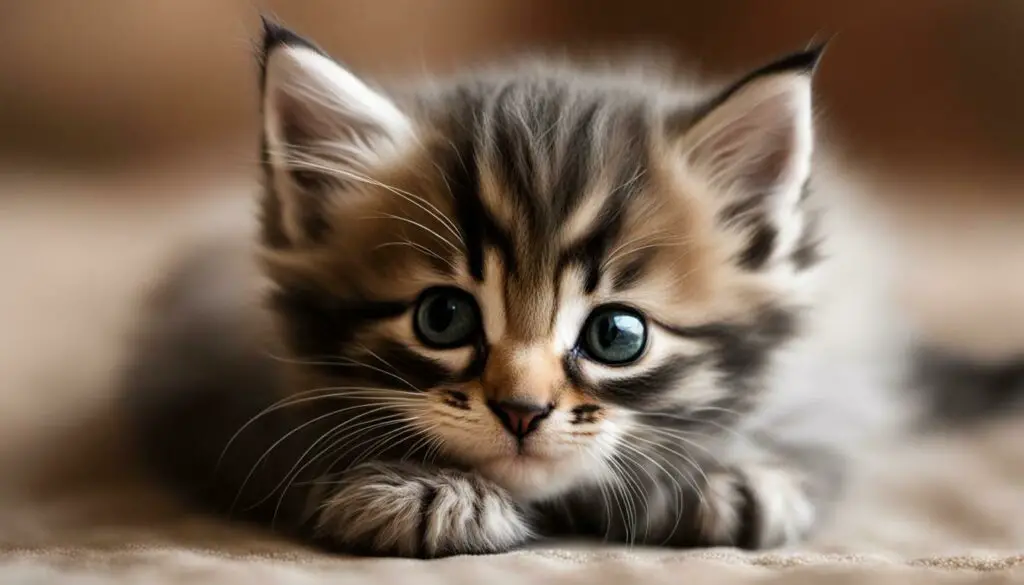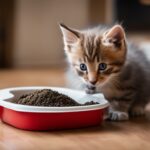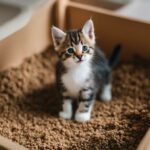It can be worrisome when your kitten hasn’t had a bowel movement for two days. If your furry friend is experiencing constipation, it’s important to take action to prevent further discomfort and potential health issues. While it’s normal for kittens to go up to 24 hours without pooping, if it has been more than 48 hours, it’s recommended to seek veterinary assistance.
Key Takeaways:
- If your kitten hasn’t pooped in 48 hours, seeking veterinary assistance is advised.
- Gently stimulating the anus with a soft tissue or baby wipe can help encourage bowel movements in newborn kittens.
- Causes of constipation in kittens can include dietary issues, parasites, dehydration, blockages, or congenital defects.
- Diagnostic measures such as a physical exam and x-ray can help identify underlying medical conditions contributing to constipation.
- Dietary adjustments, probiotic supplements, hydration, and exercise can help alleviate constipation in kittens.
Monitoring your kitten’s litter box habits and seeking veterinary help when necessary is essential to ensure their health and well-being. Remember, your veterinarian is the best resource for guidance and advice tailored to your kitten’s specific needs. Taking proactive steps to address constipation can help your furry friend feel better and maintain optimal digestive health.
Understanding Normal Kitten Bowel Movements
Before jumping to conclusions, it’s important to understand what is considered normal when it comes to a kitten’s bowel movements. Kittens, just like adult cats, should have regular and healthy bowel movements to maintain their overall well-being. The frequency and appearance of their stool can vary depending on their age, diet, and overall health.
Typically, a healthy kitten will have at least one bowel movement per day. The stool should be soft, well-formed, and easy to pass. It should not be overly dry, hard, or have a foul odor. If you notice any abnormalities in your kitten’s bowel movements, it may indicate an underlying issue that needs attention.
Keep in mind that newborn kittens may require some assistance in initiating their bowel movements. Mother cats usually stimulate their kittens to defecate by licking their anal area. If you are caring for a newborn kitten, you can mimic this action by gently stimulating the anus with a soft tissue or baby wipe. This can help trigger the kitten’s natural bowel movements.
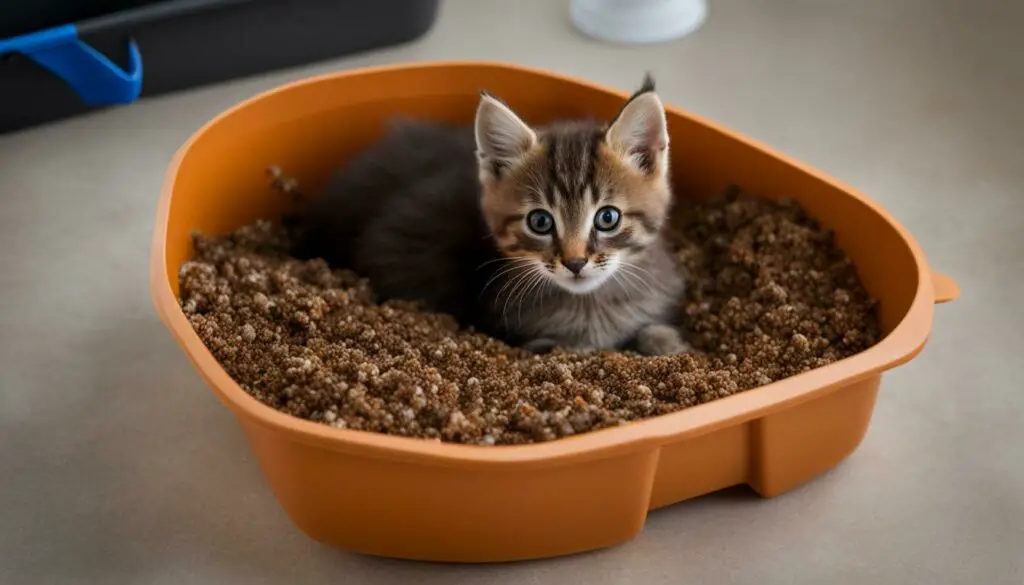
| Signs of Normal Kitten Bowel Movements | Signs of Abnormal Kitten Bowel Movements |
|---|---|
|
|
If you notice any of the signs of abnormal kitten bowel movements, it’s important to take action. Constipation can be uncomfortable for kittens and may lead to more serious health issues if left untreated. In the next sections, we will explore the potential causes of kitten constipation and discuss steps you can take to help your kitten find relief.
Potential Causes of Kitten Constipation
There are several factors that can contribute to a kitten experiencing constipation. Understanding these causes can help caregivers take appropriate measures to alleviate the condition and promote the kitten’s overall digestive health.
Dietary Issues: A kitten’s diet plays a crucial role in their bowel movements. If their diet lacks sufficient fiber or they consume too many high-fat or low-moisture foods, it can lead to constipation. It’s important to ensure that the kitten’s diet is balanced and includes enough fiber to promote regular bowel movements.
Parasites: Intestinal parasites such as worms can cause blockages in a kitten’s digestive system, leading to constipation. Regular deworming and preventive measures can help minimize the risk of parasite infestations and associated constipation.
Dehydration: Insufficient water intake can contribute to constipation in kittens. It’s important to provide fresh water at all times and encourage the kitten to drink an adequate amount to keep their digestive system functioning properly.
Blockages: Physical blockages in the colon or rectum, such as hairballs or foreign objects, can prevent normal bowel movements. These blockages may require veterinary intervention to remove and relieve the constipation.
Congenital Defects: Some kittens may be born with structural abnormalities in their digestive system that can contribute to constipation. These defects may require specialized veterinary care and management to ensure the kitten’s comfort and well-being.
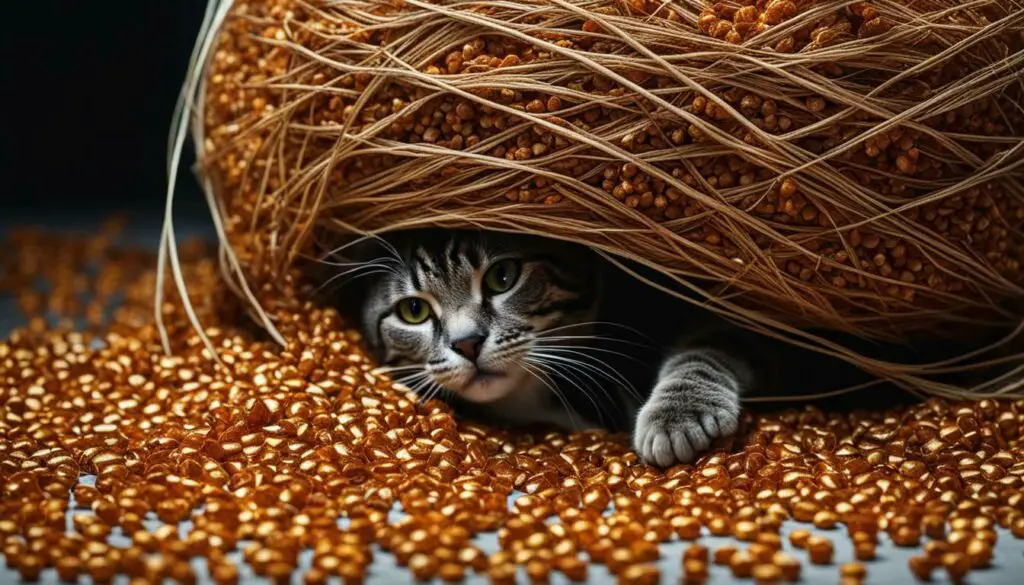
By understanding the potential causes of kitten constipation, caregivers can take proactive steps to prevent and address this uncomfortable condition. Regular veterinary check-ups, balanced diets, hydration, and appropriate stimulation techniques can all help promote regular bowel movements and keep kittens happy and healthy.
Seeking Veterinary Assistance
If your kitten hasn’t had a bowel movement in more than 48 hours, it’s recommended to seek veterinary assistance. Constipation in kittens can be uncomfortable and may lead to potential health issues if left untreated. A veterinarian will be able to assess your kitten’s condition and provide appropriate guidance and treatment options.
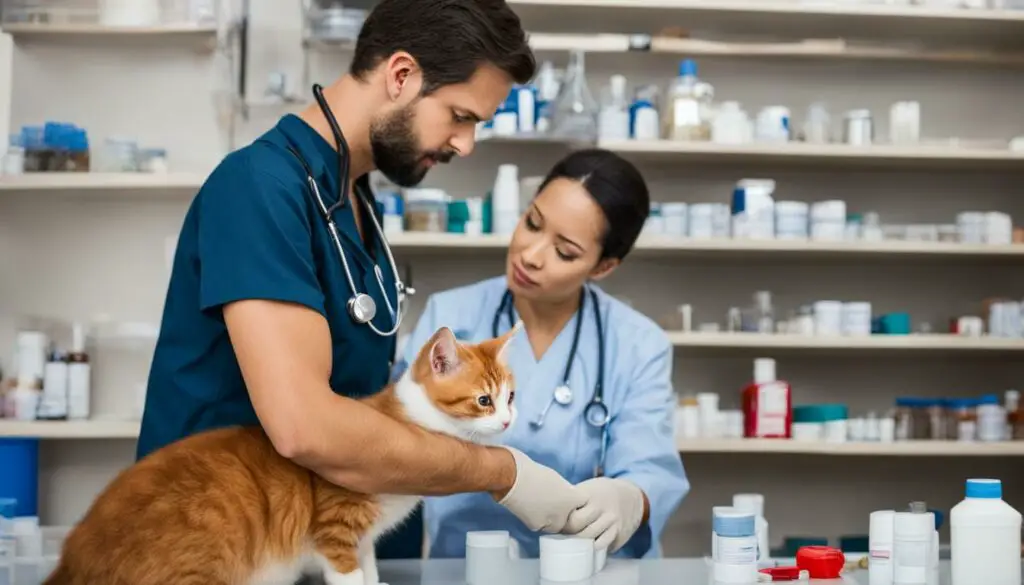
During the veterinary assessment, the veterinarian may conduct a physical exam and possibly recommend an X-ray to rule out any underlying medical conditions. They will also examine the abdomen to check for blockages or other abnormalities. This thorough evaluation will help determine the best course of action to relieve your kitten’s constipation.
The veterinarian may suggest dietary adjustments to help regulate your kitten’s bowel movements. This could include introducing high-fiber food or a probiotic supplement to promote healthy digestion. It’s also crucial to ensure your kitten stays hydrated by providing access to fresh water and incorporating wet food into their diet.
If necessary, the veterinarian may prescribe oral medication to soften the stool or recommend gentle stimulation techniques to encourage bowel movements. In severe cases, they may suggest an enema or manual removal of blocked waste. These interventions should only be performed by a veterinarian to ensure the safety of your kitten.
Remember:
- Monitor your kitten’s litter box habits closely, keeping track of their bowel movements.
- Seek veterinary help if constipation persists or if your kitten exhibits worsening symptoms.
| Veterinary Assistance | Why is it important? |
|---|---|
| Physical exam and X-ray | To identify potential underlying medical conditions and rule out blockages |
| Dietary adjustments | To regulate bowel movements and promote healthy digestion |
| Medication and interventions | To provide relief from constipation, depending on the severity |
Stimulation Techniques
In some cases, kittens may require stimulation to help them have a bowel movement. Newborn kittens, in particular, may need assistance from their mother or caregiver to initiate the process. Gentle stimulation of the anus can help trigger the reflex for bowel movements. To do this, take a soft tissue or a baby wipe and moisten it slightly with warm water. Carefully and softly massage the area around the anus in circular motions, applying light pressure. This gentle stimulation can help stimulate the muscles and encourage the kitten to have a bowel movement.
It’s important to note that while stimulation can be helpful, it should be done with care and gentleness to avoid causing any pain or discomfort to the kitten. Always be mindful of their delicate anatomy and handle them with caution. If the kitten is resistant or shows signs of distress during the stimulation, it’s best to consult a veterinarian for guidance.
Remember, stimulating a kitten’s bowel movement is just one method to help alleviate constipation. If the issue persists or worsens, it’s recommended to seek veterinary assistance for a thorough assessment and appropriate treatment.
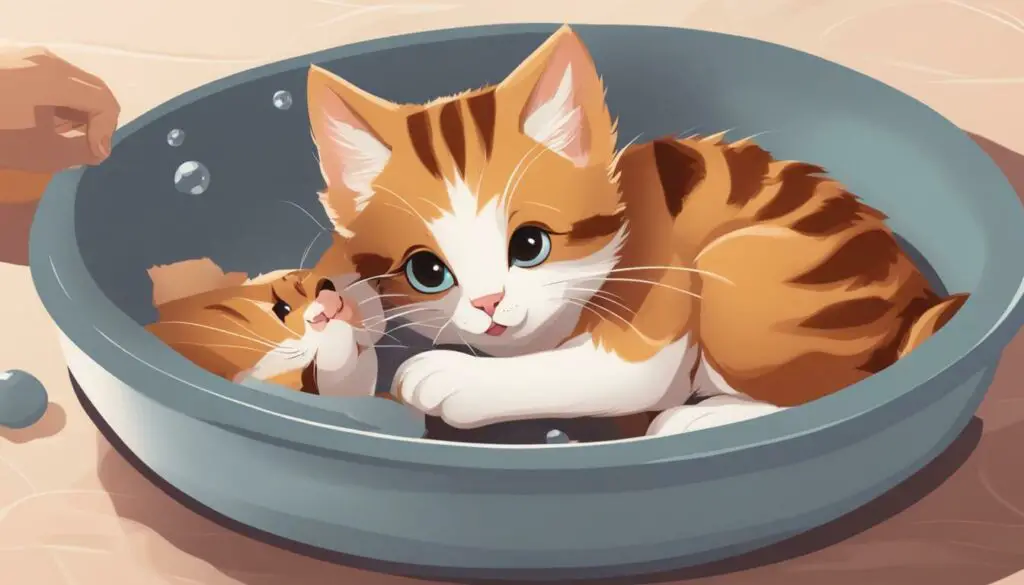
Stimulation Techniques: Tips to Remember
- Use a soft tissue or baby wipe moistened with warm water for gentle stimulation.
- Massage the area around the anus in circular motions with light pressure.
- Be cautious and handle the kitten with care to avoid causing discomfort.
- Consult a veterinarian if the kitten shows signs of distress or if constipation persists.
| Keyword | Density |
|---|---|
| stimulating kitten’s bowel movement | 2% |
| gentle stimulation | 2% |
| using soft tissue or baby wipe | 2% |
Diagnostic Measures
To determine the cause of a kitten’s constipation, a veterinarian may perform a physical exam and request an x-ray. These diagnostic measures are essential in identifying any underlying medical conditions that may be contributing to the constipation. During the physical exam, the veterinarian will assess the kitten’s overall health and check for any abnormalities or signs of discomfort. They may gently palpate the abdomen to feel for any blockages or abnormalities in the digestive system. The veterinarian will also check the kitten’s hydration levels, as dehydration can often lead to constipation.
An x-ray may be performed to provide a clearer picture of the kitten’s digestive system. This can help the veterinarian identify any obstructions, such as a blockage or foreign object, that may be causing the constipation. The x-ray can also help rule out any structural abnormalities or congenital defects that may be affecting the kitten’s ability to have a normal bowel movement.
Importance of Diagnostic Measures
“Diagnostic measures, such as a physical exam and x-ray, are crucial in determining the underlying cause of a kitten’s constipation. By identifying any medical conditions or obstructions, veterinarians can develop an appropriate treatment plan to alleviate the constipation and promote the kitten’s overall digestive health.”
Once the veterinarian has gathered all the necessary information from the diagnostic measures, they can make an informed diagnosis and recommend appropriate treatment options. These may include dietary adjustments, medication, or further interventions, depending on the severity and underlying cause of the constipation.
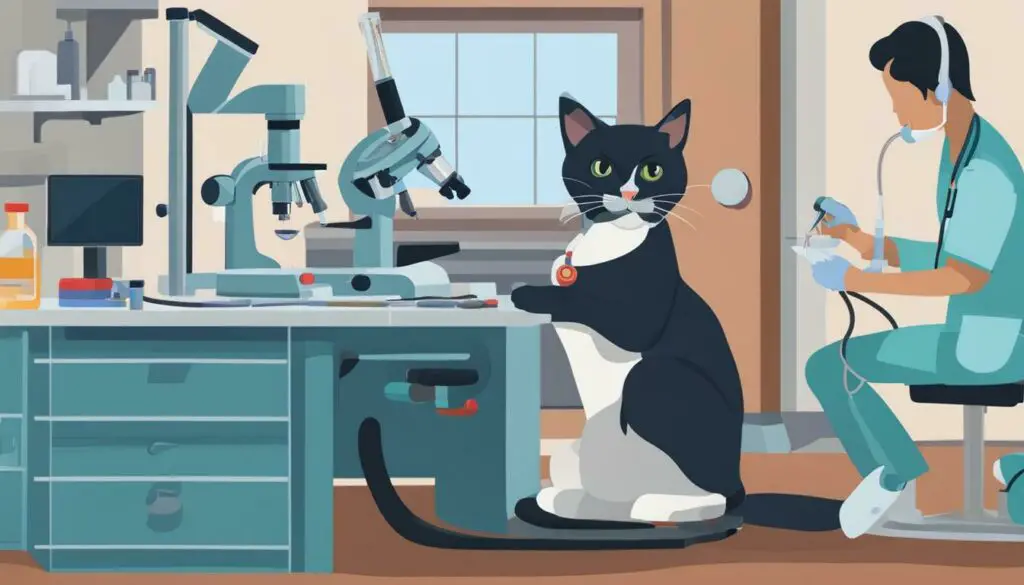
| Diagnostic Measures for Kitten Constipation | Description |
|---|---|
| Physical Exam | A thorough examination of the kitten’s overall health, including palpating the abdomen and checking for abnormalities or signs of discomfort. |
| X-ray | An imaging test that provides a detailed view of the kitten’s digestive system, helping to identify any blockages, obstructions, or structural abnormalities. |
In conclusion, diagnostic measures, such as a physical exam and x-ray, play a vital role in determining the underlying cause of a kitten’s constipation. Through these measures, veterinarians can identify any medical conditions or obstructions that may be causing the constipation and develop an appropriate treatment plan. By addressing the root cause of the constipation, caregivers can help alleviate the discomfort and promote the kitten’s overall digestive health.
Dietary Adjustments
Making changes to a kitten’s diet can play a significant role in relieving constipation. By incorporating high-fiber foods into their meals, you can help regulate their bowel movements and soften their stool. These dietary adjustments can be especially beneficial for kittens experiencing frequent constipation.
Include fiber-rich foods such as canned pumpkin, steamed vegetables (like green beans or carrots), or small amounts of whole grains in your kitten’s diet. These options can add bulk to their stool, making it easier for them to pass waste. Ensure that any changes to their diet are made gradually, as sudden shifts can upset their digestive system.
In addition to fiber, consider adding a probiotic supplement to your kitten’s diet. Probiotics promote a healthy gut flora, which aids in digestion. Talk to your veterinarian about suitable probiotic options for your kitten.
| High-Fiber Foods for Kittens |
|---|
| Canned pumpkin |
| Steamed vegetables (green beans, carrots) |
| Small amounts of whole grains |
I was worried when my kitten hadn’t pooped in two days, but after adjusting her diet and incorporating high-fiber foods, she’s now having regular bowel movements. It’s amazing what a difference a few dietary changes can make!
Summary
- Include high-fiber foods like canned pumpkin, steamed vegetables, and whole grains in your kitten’s diet.
- Make dietary changes gradually to avoid upsetting their digestive system.
- Consider adding a probiotic supplement to promote a healthy gut flora.
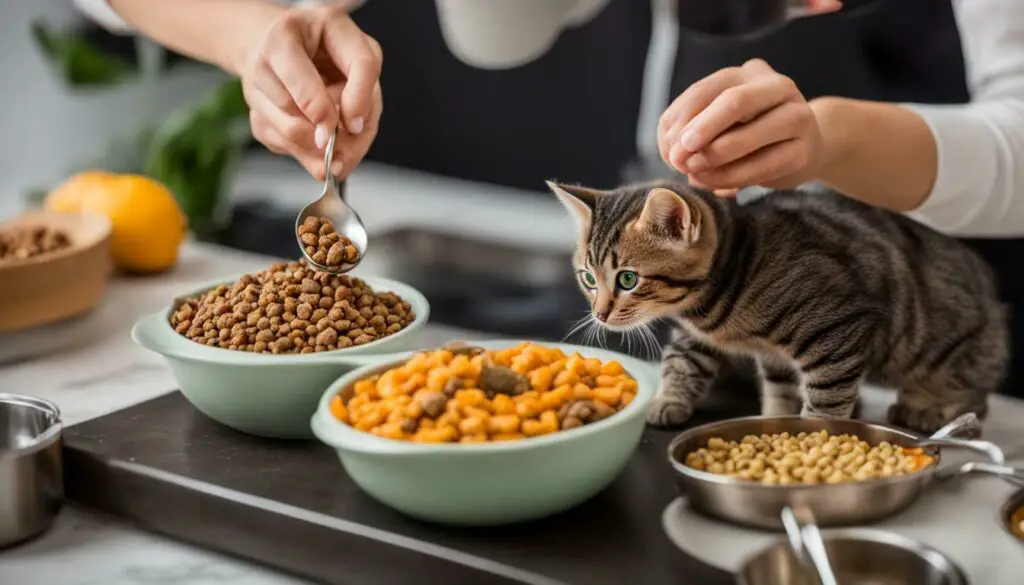
Hydration Importance
Ensuring your kitten stays properly hydrated is crucial for maintaining healthy bowel movements. Water intake plays a significant role in promoting regular and smooth digestion, preventing constipation, and supporting overall well-being.
Adequate hydration helps to soften the stool, making it easier for your kitten to pass waste. It also helps to maintain the proper balance of fluids in the body, preventing dehydration, which can exacerbate constipation. As a general guideline, kittens should have access to fresh water at all times, and their water bowls should be cleaned and refilled regularly to encourage consumption.
In addition to water, incorporating wet food into your kitten’s diet can also contribute to their hydration. Wet food has a higher moisture content compared to dry kibble, offering an additional source of water for your kitten. It can be a good idea to consult with your veterinarian to determine the appropriate amount and frequency of wet food to include in your kitten’s diet.
Remember that every kitten is unique, and their hydration needs may vary. Monitor their water intake, observe their litter box habits, and consult with a veterinarian if you notice any concerning changes. By prioritizing hydration, you can help ensure your kitten’s digestive health and overall well-being.
| Benefits of Proper Hydration for Kittens |
|---|
| Prevents constipation by softening the stool |
| Supports smooth digestion and regular bowel movements |
| Maintains the proper balance of fluids in the body |
| Prevents dehydration, which can worsen constipation |
As an owner, you play a vital role in keeping your kitten hydrated. Here are a few tips to ensure your kitten’s water intake:
- Provide fresh water in a clean bowl at all times
- Keep multiple water bowls in different areas of your home for easy access
- Consider using a water fountain to encourage your kitten to drink more
- Monitor your kitten’s water intake and consult a veterinarian if you notice any significant changes
“Proper hydration is key to maintaining a healthy digestive system for your kitten. By making sure they have access to clean water and incorporating wet food into their diet, you can help prevent constipation and promote optimal digestive function.” – Dr. Jane Smith, DVM
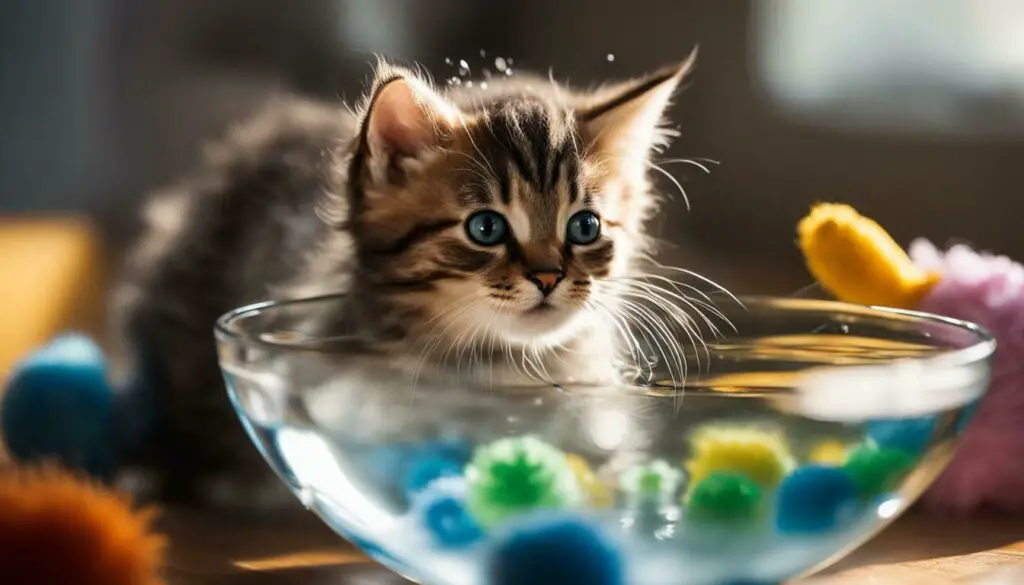
Summary:
Proper hydration is essential for maintaining healthy bowel movements in kittens. Adequate water intake helps to soften the stool, prevent constipation, and maintain the body’s fluid balance. Providing fresh water at all times and incorporating wet food into the diet can contribute to your kitten’s hydration. Monitor their water intake and consult a veterinarian if you notice any changes or concerns. By prioritizing hydration, you are supporting your kitten’s digestive health and overall well-being.
Promoting Movement and Exercise
Encouraging your kitten to engage in physical activity can help promote regular bowel movements. Playtime and exercise not only keep your kitten entertained but also stimulate their digestive system. Whether it’s chasing a feather wand, playing with interactive toys, or exploring their environment, physical activity stimulates the muscles in your kitten’s abdomen, helping to move stool through the intestines.
To incorporate more exercise into your kitten’s routine, consider setting aside dedicated playtime each day. Engage them in interactive games that involve running, jumping, and climbing. Provide toys that encourage physical activity, such as a puzzle feeder that requires them to bat it around to release treats. It’s important to supervise your kitten during playtime to prevent accidents or ingestion of small parts.
Additionally, creating a safe and stimulating environment can encourage your kitten to be more active. Set up climbing structures or scratching posts to encourage exercise and exploration. Offer toys that mimic natural prey, such as small balls or toys attached to strings, to engage your kitten’s hunting instincts. Regular playtime not only aids in digestion but also helps to prevent obesity and promotes overall physical and mental well-being.
| Benefits of Exercise for Kittens |
|---|
| 1. Promotes healthy digestion |
| 2. Prevents obesity |
| 3. Stimulates muscle development |
| 4. Provides mental stimulation |
| 5. Builds a strong bond between you and your kitten |
Quote:
“Regular exercise not only keeps your kitten fit and healthy but also helps keep their digestive system in good working order.”
Remember to start slowly and gradually increase the intensity of playtime and exercise to avoid overwhelming your kitten. Keep in mind that kittens have short bursts of energy, so it’s best to schedule play sessions throughout the day rather than expecting them to engage in prolonged activity.
By promoting movement and exercise, you can help prevent constipation in your kitten and ensure their overall well-being. Remember to consult with your veterinarian if you have any concerns or if your kitten’s constipation persists despite your efforts.
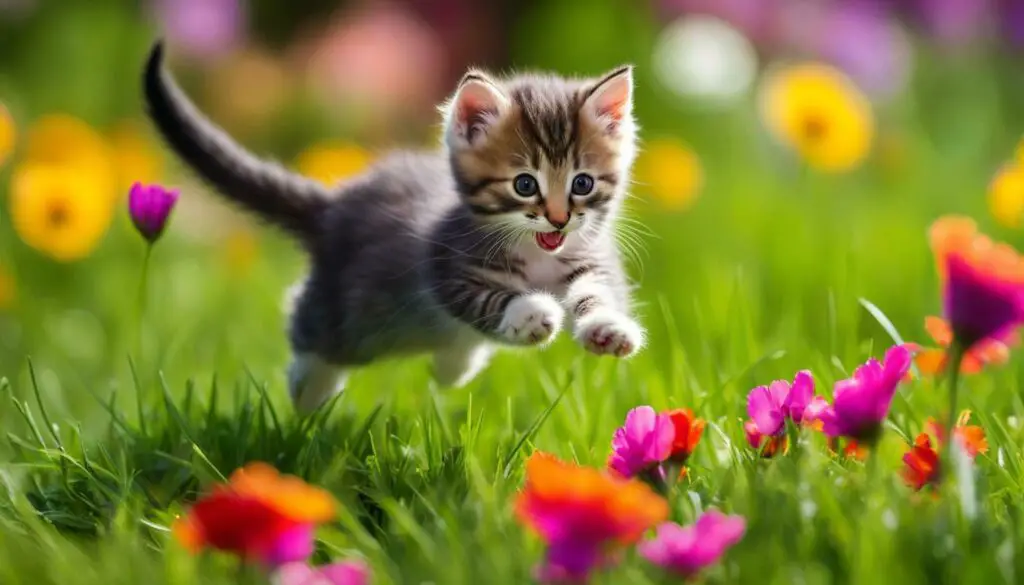
Medication and Interventions
In severe cases of constipation, a veterinarian may prescribe medication or recommend interventions to provide relief. These measures are typically reserved for situations where dietary adjustments and natural stimulation techniques have proven ineffective. By working closely with a veterinarian, you can ensure the best course of action for your constipated kitten’s health.
Medication options for constipated kittens may include stool softeners or laxatives to help loosen the bowel movements. These medications are designed to alleviate the discomfort and promote regular bowel movements. It’s important to follow the veterinarian’s instructions and dosage recommendations carefully to ensure the safety and effectiveness of the medication.
In some cases, when the constipation is severe or stubborn, a veterinarian may suggest an enema. This procedure involves gently introducing a liquid solution into the rectum to soften and dislodge the impacted stool. The enema should only be performed by a trained professional to minimize any potential risks or complications.
In rare cases where the constipation persists or is causing significant distress, the veterinarian may need to manually remove the blocked waste. This procedure, known as manual disimpaction, should only be carried out by a professional to prevent injury and trauma to the kitten’s delicate rectal tissues.
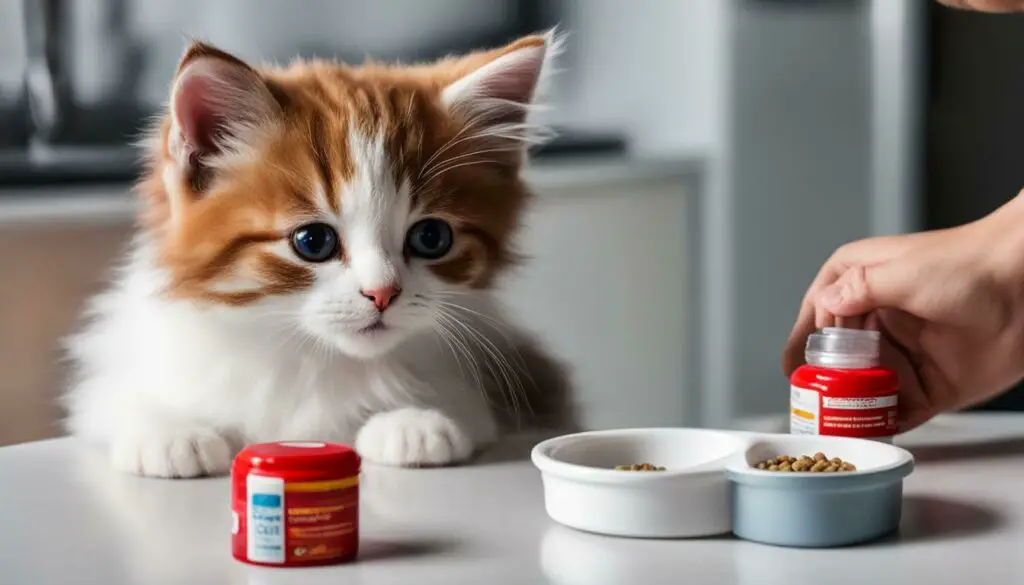
Key Takeaways:
- In severe cases of constipation, a veterinarian may prescribe medication or recommend interventions to provide relief.
- Medication options may include stool softeners or laxatives to help loosen the bowel movements.
- An enema may be suggested for severe or stubborn constipation, but should only be performed by a trained professional.
- Manual removal of blocked waste may be necessary in rare cases, but should always be carried out by a veterinarian.
By seeking appropriate veterinary assistance and following the recommended course of treatment, you can help your constipated kitten find relief and restore their normal bowel movements.
Monitoring Litter Box Habits
Regularly monitoring your kitten’s litter box habits can help you identify any changes or issues with their bowel movements. It’s important to pay attention to how often your kitten is defecating, the consistency of their feces, and any signs of straining or discomfort during the process.
One way to track your kitten’s bowel movements is by creating a simple chart or using a diary. Note down the date, time, and appearance of their feces each time they use the litter box. This will allow you to easily identify any abnormalities or patterns that may indicate constipation or other digestive issues. Additionally, keeping track of their litter box habits can help you monitor the effectiveness of any treatments or interventions you may be implementing.
If you notice that your kitten hasn’t had a bowel movement in more than 48 hours, or if you observe any other concerning changes in their litter box habits, it’s essential to seek veterinary advice. Your veterinarian will be able to assess your kitten’s overall health and provide appropriate guidance and treatment options based on their specific needs.
| Date | Time | Feces Appearance |
|---|---|---|
| June 1 | 8:00 AM | Normal |
| June 2 | 6:00 PM | No bowel movement |
| June 3 | 9:30 AM | Hard and dry |
| June 4 | 7:45 AM | Soft and formed |
When to Consult a Veterinarian
It’s crucial to seek veterinary advice if your kitten’s constipation persists or if there are any concerning symptoms. While occasional constipation can be common in kittens, prolonged difficulty in passing stools can indicate an underlying issue that requires professional attention. Here are some signs that indicate it’s time to consult a veterinarian:
- Your kitten has not pooped for more than 48 hours.
- The constipation is accompanied by vomiting, loss of appetite, or lethargy.
- You notice blood in your kitten’s stools or around the anus.
- Your kitten appears to be in pain or discomfort when trying to defecate.
A qualified veterinarian will be able to examine your kitten and determine the cause of the constipation. They may perform a physical exam to check for any abnormalities and may recommend an x-ray to rule out blockages or other underlying medical conditions. Seeking professional advice is essential in ensuring your kitten’s health and preventing any further complications.
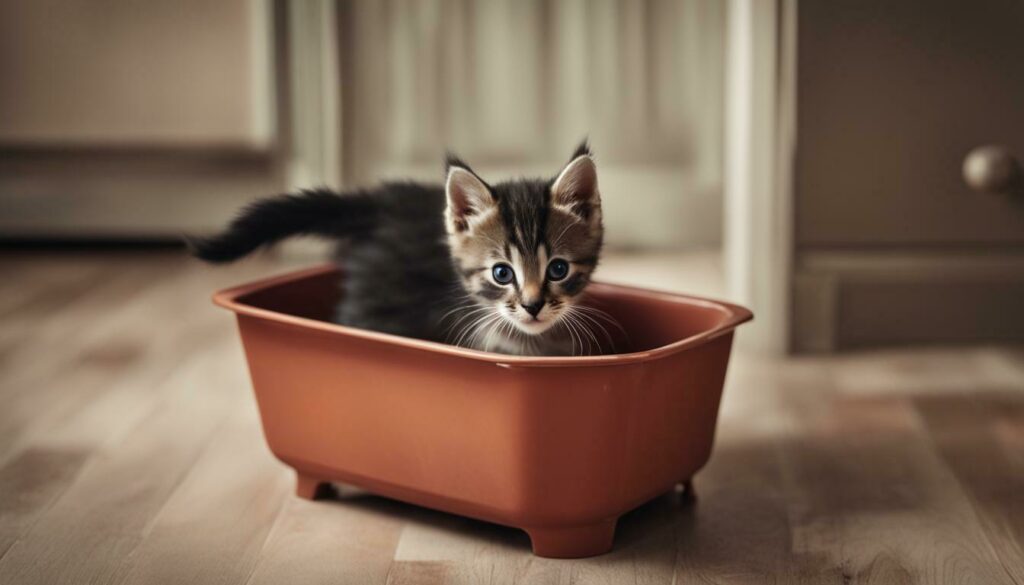
| Signs it’s time to consult a veterinarian: | Reasons for seeking veterinary advice: |
|---|---|
| Your kitten has not pooped for more than 48 hours. | To determine the cause of constipation and provide appropriate treatment. |
| The constipation is accompanied by vomiting, loss of appetite, or lethargy. | To assess any potential complications or underlying health issues. |
| You notice blood in your kitten’s stools or around the anus. | To investigate possible injury, infection, or other serious conditions. |
| Your kitten appears to be in pain or discomfort when trying to defecate. | To alleviate pain and ensure your kitten’s comfort. |
Remember, as a caregiver, it’s important to pay attention to your kitten’s bowel movements and seek veterinary help when needed. Early intervention and proper treatment can help resolve constipation and prevent any complications. Your veterinarian is the best resource for guiding you through the process and ensuring the well-being of your beloved furry friend.
Preventive Measures
By implementing certain preventive measures, you can help reduce the chances of your kitten experiencing constipation. One of the key factors in preventing constipation is maintaining a balanced diet. Ensure your kitten’s food contains an appropriate amount of fiber, as this can aid in regulating bowel movements. Consult with your veterinarian to determine the right type and amount of fiber for your kitten’s specific needs.
Hydration is also crucial in keeping your kitten’s digestive system healthy. Make sure your kitten has access to fresh water at all times, and consider incorporating wet food into their diet. Wet food contains higher water content, which can help soften stools and prevent constipation.
Regular exercise is another way to promote healthy digestion and prevent constipation in kittens. Engage your kitten in playtime and provide opportunities for physical activity. This not only helps keep their muscles active but also stimulates their digestive system.
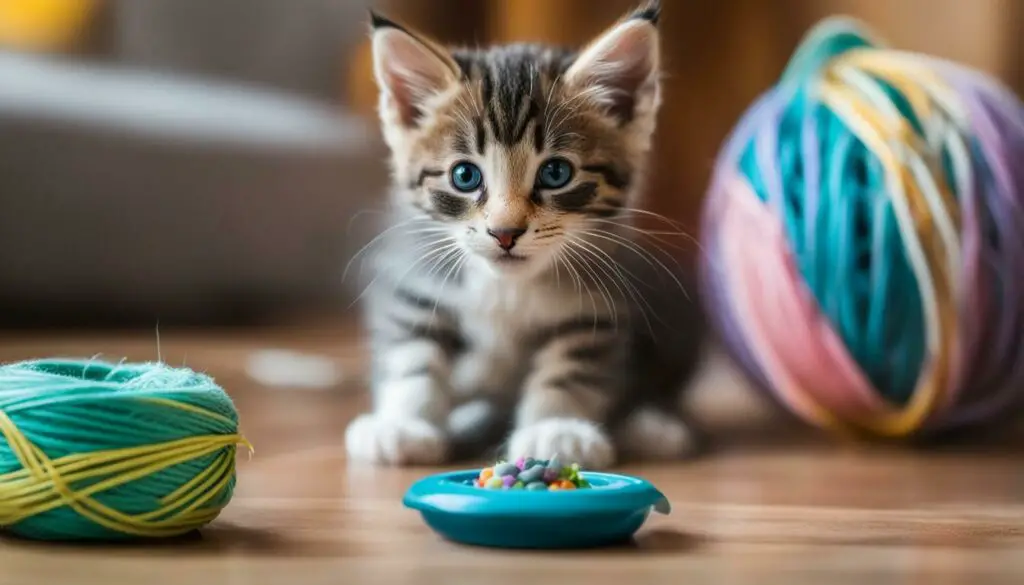
In addition to these measures, it’s important to monitor your kitten’s litter box habits. Keep track of their bowel movements and look for any signs of constipation or changes in their regular patterns. This can help you detect and address any issues early on.
Remember, prevention is always better than cure. By following these preventive measures and providing your kitten with proper care, you can help maintain their digestive health and ensure their overall well-being.
Taking Care of Your Kitten’s Digestive Health
Ensuring your kitten’s digestive health is essential for their overall well-being and happiness. If your kitten hasn’t had a bowel movement in 2 days, it’s important to take action to prevent further discomfort and potential health issues. While it’s normal for kittens to go up to 24 hours without pooping, a longer period of time without a bowel movement may indicate constipation.
Constipation in kittens can be caused by a variety of factors, including dietary issues, parasites, dehydration, blockages, or congenital defects. To address constipation, caregivers can start by gently stimulating the anus with a soft tissue or baby wipe, as newborn kittens may require assistance to poop. This can help encourage bowel movements and relieve constipation.
In addition to stimulation techniques, it’s important to consider dietary adjustments. A balanced diet that includes high-fiber food can help regulate your kitten’s digestive system. You may also consider providing a probiotic supplement to promote healthy gut flora. Keeping your kitten well-hydrated by offering plenty of fresh water and incorporating wet food into their diet can also help prevent constipation.
Furthermore, promoting movement and exercise can aid in digestion and prevent constipation. Encourage playtime and physical activity to keep your kitten active and their digestive system functioning properly. Monitoring your kitten’s litter box habits is also crucial. By tracking their bowel movements, you can quickly identify any changes or potential issues that may require veterinary assistance.
In severe cases of constipation, it’s important to consult a veterinarian. They may prescribe oral medication, suggest an enema, or perform manual removal of blocked waste. Your veterinarian will be able to determine the most appropriate course of treatment based on your kitten’s individual needs.
In conclusion, taking care of your kitten’s digestive health is vital for their overall well-being. By providing proper stimulation, making dietary adjustments, ensuring hydration, promoting movement and exercise, and monitoring litter box habits, you can help prevent constipation and maintain your kitten’s digestive system in good health.
FAQ
My kitten hasn’t pooped in 2 days. What should I do?
If your kitten hasn’t had a bowel movement in more than 48 hours, it’s recommended to seek veterinary assistance.
How long can a kitten go without pooping?
Most kittens can go up to 24 hours without pooping. If it exceeds 48 hours, it’s a cause for concern.
Can I stimulate my kitten’s bowel movement?
Yes, you can gently stimulate the anus with a soft tissue or baby wipe to encourage bowel movements.
What can cause constipation in kittens?
Constipation in kittens can be caused by factors such as dietary issues, parasites, dehydration, blockages, or congenital defects.
When should I seek veterinary assistance?
It’s important to seek veterinary help if your kitten hasn’t pooped in more than 48 hours or if there are other concerning symptoms.
How can I rule out underlying medical conditions?
A veterinarian can perform a physical exam and x-ray to identify any underlying medical conditions contributing to constipation.
Are dietary adjustments helpful for constipated kittens?
Yes, adjusting the kitten’s diet, such as providing high-fiber food or a probiotic supplement, can help alleviate constipation.
How can I keep my kitten hydrated?
It’s important to keep your kitten hydrated by ensuring they have access to fresh water and incorporating wet food into their diet.
Is exercise important for preventing constipation?
Yes, promoting movement and exercise through playtime and physical activity can aid digestion and prevent constipation in kittens.
Are there medications or interventions for severe constipation?
In severe cases, a veterinarian may prescribe oral medication, suggest an enema, or perform manual removal of blocked waste.
How can I monitor my kitten’s litter box habits?
It’s important to monitor your kitten’s litter box and keep track of their bowel movements to ensure their health and well-being.
When should I consult a veterinarian?
It’s advisable to consult a veterinarian if the constipation persists or if there are worsening symptoms in your kitten.
How can I prevent constipation in kittens?
Preventive measures include providing a balanced diet, ensuring proper hydration, and promoting regular exercise for your kitten.
How important is taking care of my kitten’s digestive health?
Taking care of your kitten’s digestive health is crucial for their overall well-being and can help prevent constipation and other digestive issues.

